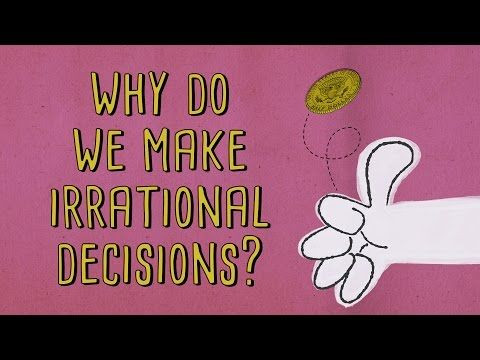The Psychology Behind Irrational Decisions Has A Lot To Do With How You Manage Emotions

We go window shopping and see something that we don’t need, but it’s on sale, so we buy it. Although we like to think the decisions we make in life are driven by reason, sometimes our choices are more irrational. We are more likely to make decisions based on previous experience and intuition, rather than by careful analysis.
In TED-Ed's latest video, “The Psychology Behind Irrational Decisions” host Sara Garofalo explains we make decisions that are not “rational”' from a purely economical point of view, meaning they don't necessarily lead to the best result.
So why do we still make irrational decisions?
Loss aversion is what behavioral economists call the tendency to strongly prefer avoiding losses to acquiring gains. Garofalo explains in the video that this approach to decisions is susceptible to taking mental shortcuts that can lead to irrational decisions. Situations that involve probability are notoriously bad for applying heuristics, any type of problem solving deemed not to be perfect but sufficient for immediate goals.
Meanwhile, in conjunction fallacy, our brain tricks us into picking options that are more detailed than general ones. For example, in one study, researchers asked the participants to consider a regular six-sided die with four green faces and two red faces, where the die will be rolled 20 times and the sequence of greens (G) and reds (R) will be recorded. They were asked to select one sequence, from a set of three, and rewarded $25 if the sequence they selected appears on successive rolls of the die (RGRRR, GRGRRR. GRRRRR). More than half of the participants chose the second sequence, although option one is contained within it and is shorter than the other options.
The anchoring effect can also influence our decision-making since it’s often used in marketing and negotiations. In other words, businesses can raise the prices that people are willing to pay. So, although we don’t need that shirt, the fact that it’s “on sale” entices us to make a purchase.
Other theories suggest irrational behavior stems from the inability to override automatic emotional responses, or let our feelings and experiences get the best of us. Humans act irrationally as a consequence of biasing influences, and are strongly and consistently affected by the way a question is presented. A University College London study found even when both options lead to the same result, participants were more likely to gamble at the threat of losing £30 than the option to keep £20. In the same study, brain imaging revealed that the amygdala, the region that controls emotions and mediates the "fight or flight" reaction, underpinned this bias in the decision-making process.
Moreover, people with more rational behavior had greater brain activity in the prefrontal cortex — the region known to be involved in higher-order executive processes — suggesting that their brains are better equipped to deal with emotions in a more balanced reasoning process.
Despite cognitive basis, we can overcome our brain's heuristics by learning to be aware of them. When we encounter a situation involving numbers, probability or multiple details — let’s pause for a second, and consider that the intuitive answer may not be what's best after all.



























